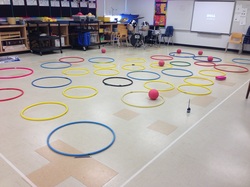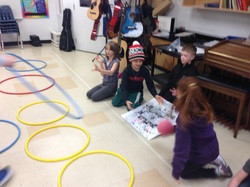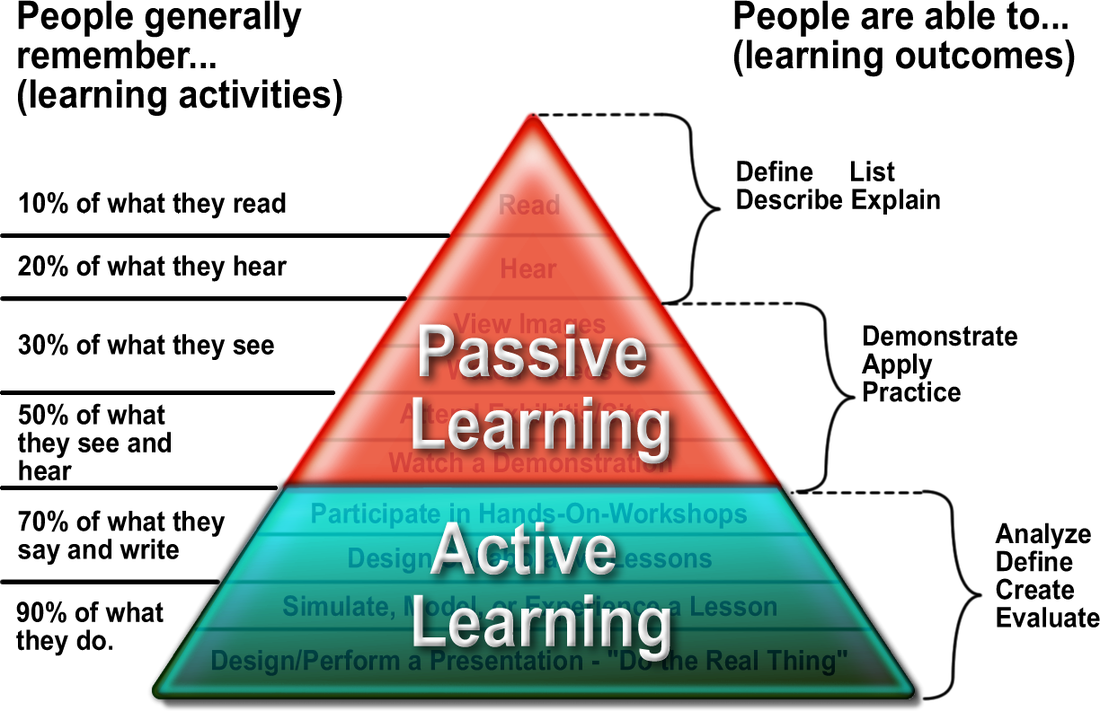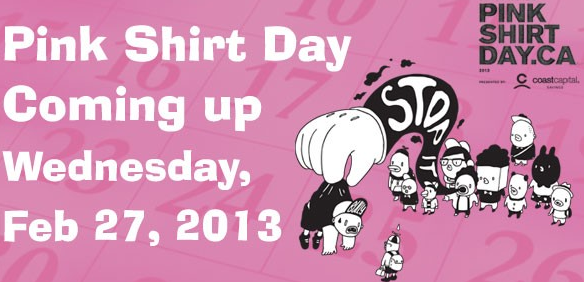In learning, students’ mirror neurons likely play a significant role in developing skill mastery. Teacher modeling, a common classroom practice, is a powerful instructional activity for skill learning. However, going through the motions is not enough. Research suggests we attend to specifics when we demonstrate new skills. Specifically, three details “matter.” Read more..... just click on the titleTests 'should not rank pupils against one another'http://www.telegraph.co.uk/education/educationnews/9900555/Tests-should-not-rank-pupils-against-one-another.html
 There are no desks, no pencils, no papers in this learning space, just masking tape outlining a large area that is filled with hoola hoops, balls and Stephen Harper signs. No this is not a gym class! This a grade 4 science lesson on inclined planes. Students are learning about teamwork, speed, velocity, force and angles. Their goal is to work with their team using the cardboard sign to roll a ball into a hoola hoop.
 "Ready, set, go." The teams release the balls. When a ball lands in a hoola hoop everyone cheers in excitement. When it rolls right through the hoop the debating begins. I overhear students debating how high and low to hold the sign so that the angle is just right and how much force is needed to get the ball into the hoop. One student comments that "we need to decrease the angle and increase the force this time." The teacher guides the students throughout the learning and ALL students are engaged. I leave the classroom excited to see tomorrow's learning. Imagine how the students feel.
Bullying
Are We Wringing the Creativity Out of Kids?http://blogs.kqed.org/mindshift/2012/05/are-we-wringing-the-creativity-out-of-kids/“Every child is born an artist. The problems begin once we start to grow up.” Actually, Lehrer noted, the problems begin in a very specific time frame: the years covering third, fourth, and fifth grade. It’s during this period, he says, that many kids “conclude that they are not creative, and this is in large part because they start to realize that that their drawing is not quite as pretty as they would like, that they can put the brush in the wrong place, that their short stories don’t live up to their expectations—so they become self-conscious and self-aware, and then they shut themselves down.” Parents and teachers must intervene during this crucial window to ensure that children’s creativity doesn’t wither.
Top 10 Posts of 2012: Deep, Meaningful and Creative Learninghttp://blogs.kqed.org/mindshift/2012/12/top-10-posts-of-2012-deeper-more-meaningful-and-creative-learning/
Division Professional Learning Day March 8th We are moving from “I attended …” to “I learned and then implemented and shared…” https://docs.google.com/document/d/165X0U46Igv_tsnpLpIcI0BRc6CSeq-KNqfdUj8fNrLA/edit?usp=sharingFrom the teacher list - Pete McKayThis is a great interactive that allows a student to compare their home country to any other in the world. It offers comparative statistics and its most impactful visual is an overlay of one country map over the other. Be sure to check out the two disasters that are featured - the BP Oil Spill and the Pakistan Floods of 2010. The reaching effects of these disasters can be displayed as an overlay on a map of your home. It really gives a clear idea of the scale of such events. To use the information in a relevant manner, your browser may ask you for permission to use your location. -- The URL: http://www.ifitweremyhome.comAssessing CreativityArticle by Susan Brookharthttp://www.ascd.org/publications/educational-leadership/feb13/vol70/num05/Assessing-Creativity.aspx
The unpredictability of the future is what education is to prepare children for. Children have extraordinary talents that are ruthlessly squandered in school. Creativity is as important as literacy. - Sir Ken Robinson
We are grateful for the work our AISI contact teachers and administrators are doing to move the knowledge we have gained from our AISI work into action.
This is a list of the shared actions that are taking place in our schools.....
- whole school SmartLearning sequences
- side by side teaching
- distribution of leadership
- modelling by teachers for teachers
- cross- grade development of inquiry projects
- review of school structures
- instructional rounds within schools
- pyramid of intervention practices
- words their way implementation
- data collection
- construction of common assessments and exemplars
- building community
- professional learning as part of everyone’s day - a way of being
- sharing of action research questions and results
- blending of strategies from the three cohorts
Math - Engaging our learners - Where are we heading in this handbasket?http://engagingourlearners.blogspot.ca/"I'm not opposed to memorizing facts. Somewhere along the line, I've memorized the various spells in Harry Potter, the positions on a football field, and the lyrics to my favorite songs. I've memorized lines from conversations, verses from the Bible, and "facts" regarding Social Constructivism, Social Constructionism and Social Connectivism. I never crammed for a test. I never wrote out the facts in isolation under the watchful gaze of a teacher with a timer. I learned these things through immersion, critical thinking, context and play." ( From a Blog post written by John Spencer: http://www.educationrethink.com/2012/05/memorizing-math-facts.html?m=1 ) A Whole Child Deserves a Whole Teacher
Habit of Mind for Teachers
http://www.wholechildeducation.org/blog/a-whole-child-deserves-a-whole-teacher What is the likelihood that . . . - they will persevere through disappointment and challenge in their teaching, spending additional time consulting others and reviewing and revising their decisions when hoped-for results have not occurred? Persisting
- in the process of teaching and concentrating on the responses of an individual student, they use an eagle view of the classroom to monitor the entire class? Metacognition (Thinking about Thinking)
- faced with stubborn problems, they can perceive them flexibly from various perspectives of the disappointed mother, the ambitious father, or the anxious child? Thinking Flexibly
- they will take disappointments in stride and ask themselves how they can cope with and learn from these rather than blaming others? Remaining Open to Continuous Learning
- they will insist on high-quality performance from themselves and their students and accept nothing less? Striving for Accuracy and Precision
- they will regard teaching as a collaborative pursuit, engaging with others in applying systemic solutions to persistent problems? Thinking Interdependently
Arthur L. Costa Education’s new Mental Health Matters web pages www.education.alberta.ca/mentalhealthmatters - lesson experiences designed to support administrators and teachers in helping children and youth feel comfortable talking about mental health and well-being, reduce barriers in the classroom and contribute to the welcoming, caring, respectful and safe learning environment that all students need to succeed. Seven Essential Principles of Innovative Learninghttp://blogs.kqed.org/mindshift/2013/02/7-essential-principles-of-innovative-learning/
photo credit www.yoganonymous.com Random Acts of Kindness week - Feb. 11-15thTurn Your Classroom into an Inquiry-Based Design Studiohttp://www.ascd.org/ascd-express/vol8/808-stevens.aspx?utm_source=ascdexpress&utm_medium=email&utm_campaign=express808Anne Hayden Stevens Inspire Students Through a Google+ Hangout With an X-Men Editor The Purple Feet Foundation, a non-profit whose purpose is to spark students' interests in career options, is hosting a Google+ Hangout with Nick Lowe. Nick Lowe is the Senior Editor of the X-Men titles at Marvel Comics. The Hangout will happen at 1pm ET on February 22. You can register for the event hereA Differentiated Approach for Supporting Behavioral Growth in the Classroom - Great Blog check it out http://bankstreet.edu/blogs/fair-is-not-equal/The MindUp™ program, developed by the Hawn Foundation (a nonprofit established by comedian/actress Goldie Hawn), has adapted a simple mind-body awareness practice for preschool- to junior high school-aged children. Mindfulness training, as it is commonly known, has attracted increasing interest as a beneficial approach in improving children’s development, reducing stress and helping parents, caregivers and teachers to interact more skillfully and positively with children. http://www.industrymailout.com/Industry/LandingPage.aspx?id=1170565&lm=42695599&q=550056997&qz=f22502865363645b0838c259d71fd597Brain PowerDr. Bryan Kolb, one of Canada’s leading neuropsychologists, has a basic message that he delivers whenever and wherever he can.
It goes something like this: You are your brain. What happens to you before birth and during the first five years shapes the development of your brain and the course of your life.
http://www.industrymailout.com/Industry/LandingPage.aspx?id=1170758&p=1
Dr. Kolb explains early development concepts in four (one to two-minute) video clips on the Galileo Educational Network: http://galileonetwork.ca/earlylearning/?q=book/export/html/134
"The only calibration that counts is how much heart people invest, how much they ignore their fears of being hurt or caught out or humiliated." Maria Popova
Stuart reading with his Great Grandma 2013
Myron Dueck's blog
http://myrondueck.wordpress.com/
The Best Learning is Hard to Define.....
"There are many ways to classify something that makes learning fun and engaging:
If the students shared it, call it collaboration.
If they receive feedback during the learning process, call it formative assessment.
If they review each others photos, I guess it is peer assessment.
"And it is their own thing!” Personalized Learning…check."
Professional Learning Professional Learning in the Digital Age: The Educator’s Guide to User-Generated Learning- SwansonDo-it-yourself learning What is user-generated learning? Swanson defines this concept as learning acquired through active curation, reflection, and contribution to a self-selected collaborative spaceShe emphasizes that user-generated learning is something you do, not something you “get.” This is such an important point. Too often I encounter educators who believe they have nothing to contribute to online learning spaces. “Who would want to read what I have to say?” they wonder when contemplating beginning a blog of their own. “What would I tweet? Who would care?” they ask when encouraged to jump into social media conversations. Swanson answers those questions by reassuring readers that “everyone has something to contribute. We are all experts in our own ways.” Consider how Swanson defines each and how you could incorporate the practice into your own professional development. Curation is “the careful collection of relevant resources,” and Swanson describes the educator’s responsibility to serve as curator in order to find resources to help serve students. Swanson describes new methods of curation and necessary skills such as aggregation and organization in order to manage curated materials. Reflection is the next necessary component in the process, as the educator processes the information newly curated and consumed and assimilates the new information with current background knowledge. Swanson suggests several effective methods of professional reflection. Contribution is key to the user-generated learning process, where the educator contributes ideas to his learning communities. Whether through virtual participation or in a physical space, it is essential for educators to share their own unique perspectives and understandings with their learning communities. Our upcoming division professional learning day March 8th would be a great day to share what you are doing in the area of Inquiry learning, SmartLearning or Assessment for Learning.Please let Alexis or your AISI teacher contact know if you are willing to host a conversation on this day.
Executive Function - Skills for life and learningBeing able to focus, hold, and work with information in mind, filter distractions, and switch gears is like having an air traffic control system at a busy airport to manage the arrivals and departures of dozens of planes on multiple runways. In the brain, this air traffic control mechanism is called executive functioning, a group of skills that helps us to focus on multiple streams of information at the same time, and revise plans as necessary. This edition of the InBrief series explains how these lifelong skills develop, what can disrupt their development, and how supporting them pays off in school and life. Acquiring the early building blocks of these skills is one of the most important and challenging tasks of the early childhood years, and having the right support and experiences through middle childhood, adolescence, and into early adult life is essential for the successful development of these capacities. Mathhttp://mathmaster.org/Check out this site for math tutorial videos (Looks like mostly Khan Academy) and paired them with the ability to make up worksheets that cover all sorts of mathematical topics and grades. You'll also find some science topics as well. The worksheets are generated with random questions so you get a different sheet each time and they download as pdf documents. Daniel Pink on extrinsic rewards and setting the right climate in your classroom....Extrinsic rewards work in the short term for mechanical tasks that don't require much higher-order thinking, but they don't produce true motivation for work that requires higher-order thinking and creativity. However, everyone needs "baseline rewards" conditions that provide adequate compensation for one's presence and effort. At school baseline rewards might include fair grading, a caring teacher, engaging lessons, and a clean classroom. If such needs aren't met, Pink (2009) notes, the student will focus on"the unfairness of her situation and the anxiety of her circumstances.... You'll get neither the predictability of extrinsic motivation nor the weirdness of intrinsic motivation. You'll get very little motivation at all."(p. 35) http://www.ascd.org/publications/educational-leadership/oct12/vol70/num02/Eight-Things-Skilled-Teachers-Think,-Say,-and-Do.aspx
I hope you took the opportunity to make a snow angel or two over the holidays......
Wishing you the best in 2013!
Smart Learning - Susan Close, Judy Street and Anita Berekoff visit our division...
January 16 - Caroline School
January 17 - Caroline School
January 18 - Kindergarten teachers - Lochearn Elementary School 8:30
- SmartLearning Action Research Team - Division Office 9-3:30
Year in review: 10 most-tweeted education posts"The business of secondary school is not to wow students with mysticism, it’s to inspire them to pursue study in things that they didn’t even know existed months prior"http://shawncornally.com/wordpress/?p=3180A model for teaching physics:- Play. Give them some materials, an idea, or whatever, and let them play with it. You should watch like a zookeeper watches the gibbons.
- Formalize the play. Give them a task based on the results of the play. Fix this. Is that always true? How many can you make? Is there a pattern…
- Direct Instruction. Show them how their formalization matches up with a commonly accepted model. This may be a book, pedia de la wiki, some expert, whatever. Do an exemplar problem.
- Ask a better question. Now that we have some agency with the material. Have the students build something or ask something that really throws a wrench or demands to be asked. Report these results on white boards.
- Practice, maybe. Now the students can choose to do practice to further precipitate the ideas. I let them choose from mountains of problems I have on my website. Do a couple of the most enjoyable problems with the class at the board.
CARC Session for junior and senior high school Science teachers - register at https://www.consortiapd.com/ei4/cm.esp?id=15033&pageid=_37S0OXEJ5&showpage=coursedet&child=yes&parentpage=calendar&eiscript=3FD3AET0J&course=120228SCI07 Feb 28: Moving from Traditional Cookbook to Inquiry Based InvestigationsThursday, February 28, 2013 Time:9:00am - 3:30pm Fee: Red Deer $ 30.00
Course Overview:This full day workshop is designed to visit the different levels of inquiry through some hands-on activities and discussion. As the four levels of inquiry are discussed - time will be utilized to take some of the current labs you are using, and converting these to have a higher level of inquiry. Inquiry is advocated for by the Alberta Learning curriculums as it recognizes that inquiry will increase a student's involvement and recognize that there are multiple ways of knowing and determining an outcome. This active engagement through inquiry creates a more meaningful acquisition of knowledge that the students will be able to share with the world and also gain the skills needed to design their own inquiry approaches. This workshop is suitable for all science teachers in division 3 and 4. Our hands on activities are designed for teachers to experience some of the wonder and often frustrations when exposed to the highest level of inquiry and then taking these findings and helping to re-vamp their own investigations into exercises that students will gain greater inquiry skills through.Required Materials:Lap Top, Clothing that is safe in a lab, digital/hard copies of labs that you are currently using and wish to take time to adapt a higher level of inquiry within.Venue:River Glen School 4210 59 St. Red Deer Instructors: David GowansSusanne CzentyeCheck out Shelly Wright's blog -
I Used to think........http://shelleywright.wordpress.com/
"I used to think that content was the most important thing I could teach. What was I thinking? In a Google world, most of the content I once valued so highly can be accessed in seconds, making the role of content provider obsolete. Now I think skills, like collaboration, critical thinking, and being able to locate rich, reliable information are much more important. So now I use content to teach skills. I’m a skills provider." Boyshttp://blogs.edweek.org/edweek/finding_common_ground/2013/01/how_to_create_a_boy-friendly_school.htmlTransforming a school to be more learner-focused certainly places classroom instruction at the center of the initiative. But that's not enough. We have to look at all levels and layers of the organization with a critical eye for "what works" and "what doesn't work" when it comes to serving boys. Too often boys run aground or bump up against age-old institutional practices that were never created with an eye for how they will affect boys versus girls. Start with an open and honest dialogue with staff that focuses on some key school-wide questions: • When your school staff describes the "ideal student," does that description sound more like a girl than a boy? • Do teachers take away recess as a form of punishment? What is the nature of the zero tolerance policy? • Who is being referred to special education and what are the primary reasons? • What percentage of class time is dedicated to lecture as opposed to more active approaches to learning? If you use a block schedule, do teachers teach differently during the block periods? • Does your school respond to missed homework with zeroes in the gradebook or insist that the work gets done, even if it's late? • What percent of grades are based on compliance versus content mastery? • To what extent are students allowed to direct their own learning and/or to incorporate their out-of-school interests? • How might the physical environment of the classrooms and common areas be made more conducive for boys? • What does your school do to increase students' exposure to positive male role models? • In what ways do teachers create personal connections with boys - especially the disengaged, angry or resistant boy? • How might your school's time-honored ways of doing things be getting in the way of boys' success? "Responding to the learning styles of boys will help a school become more effective in meeting the needs of all students - including the girls."image credit http://www.mentoringboys.com/boy_smarts.html
|










